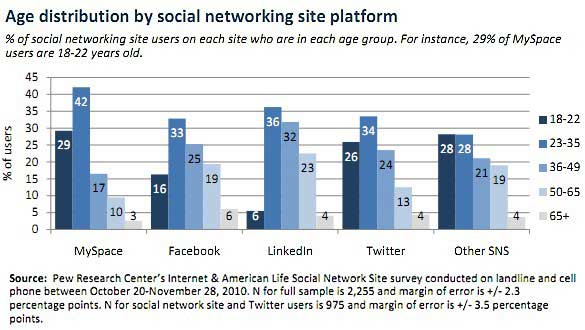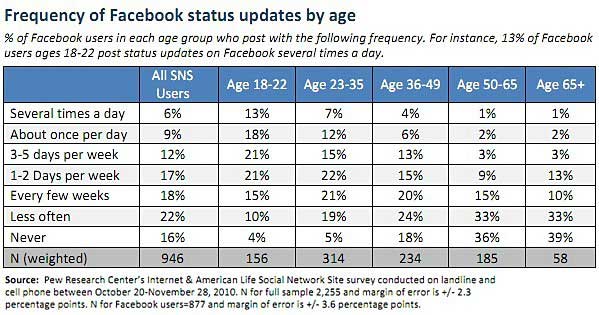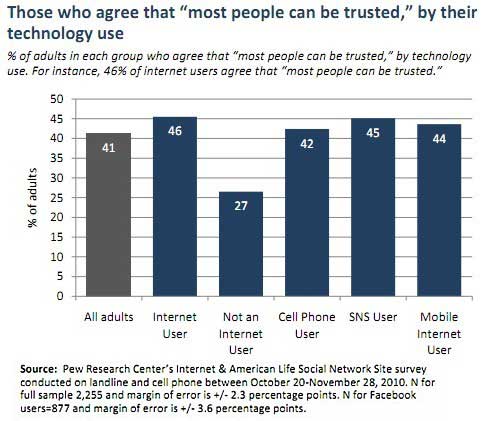Over the past two years, the number of people using social networking sites has nearly doubled, while the population of social networking users has shifted to older audience segments, according to a report by Pew Research. Now constituting a near majority of the US population (47%), people who use social sites are more politically engaged than other adults and are more likely to trust others.
Nearly one-half of US adults surveyed say they use at least one social networking site, up from the 26% who said so in 2008. That translates to 59% of online adults who now use at least one social site, up from 34% two years earlier.
Meanwhile, the average age of adults who use social sites has increased, to age 38 as of November 2010, from age 33 in 2008, with women now comprising 56% of the social networking users base (vs. 53% in 2008).
Below, additional findings from the report titled "Social Networking Sites and Our Lives, issued by the Pew Research Center's Internet & American Life Project and Project for Excellence in Journalism.
Demographics Differences Across Major Sites
The top four social networking sites—Facebook, MySpace, LinkedIn, and Twitter—each comprise a relatively distinct audience.
For example, nearly twice as many men (63%) as women (37%) use LinkedIn. All other social platforms have significantly more female users than male users.
MySpace users are the youngest overall; people age 36 and older comprise only 32% of the site's audience, whereas LinkedIn users are older (people age 36+ comprise 56% of the site's audience).

Fully one-half of Facebook users (50%) are age 36+, whereas 41% of Twitter users are age 36+.
MySpace users tend to have fewer years of formal education than users of other social network services, whereas most (65%) LinkedIn users have at least one university degree.
There are also key differences in the way people use social sites: 52% of Facebook users and 33% of Twitter users engage with the platform daily, while only 7% of MySpace and 6% of LinkedIn users do the same.
Facebook Dominance
Facebook still dominates the digital social world: 92% of social networking users use Facebook, while 29% use MySpace, 18% used LinkedIn, and 13% use Twitter.
On average, Facebook users have 229 friends on the site, with people from high school comprising the biggest share of friends (22%), followed by extended family members (12%), coworkers (10%), college friends (9%), and immediate family members (8%).
On a typical day using Facebook, users conduct a number of the following activities:
- Update their own status: 15%
- Comment on another's post or status: 22%
- Comment on another user's photos: 20%
- "Like" another user's content: 26%
- Send another user a private message: 10%
Looking for real-world examples of businesses achieving their social media marketing goals? Our 47-page case-study collection, Facebook Success Stories, shows you how to increase brand awareness, target specific markets, promote new products, and create communities that engage users. Also check out The State of Social Media Marketing, a 240-page original research report from MarketingProfs.
Women, Young Drive Facebook Use
Some 18% of women update their Facebook status at least once per day. Only 11% of men do the same.
Meanwhile, Facebook users age 35+ are the least likely to have ever updated their Facebook profile or to update their status more than 1-2 days per week.

Internet, Facebook Users More Trusting
Internet users tend to be more trusting than non-users: 46% of Internet users say "most people can be trusted," compared with 27% of non-users and 41% of all adults who say the same.

Active Facebook users are even more likely to be trusting, according to Pew. Controlling for other factors such as sex, age, and education, Facebook users who use the site multiple times per day are 43% more likely than other online Internet users and more than three times as likely as non-Internet users to say "most people can be trusted."
Social Media and Political Engagement
Given it's relatively older and more educated demographic, LinkedIn users tend to be more politically engaged and more reliable at casting votes: 14% of LinkedIn users say they attended a political rally in 2010, 36% tried to persuade someone to vote, and 79% reported that they did or intended to vote.

MySpace users are the least politically active: Only 9% attended a political rally, 18% attempted to influence someone's vote, and 57% voted or intended to vote.
Even so, Facebook is still the hub for most politically active social media users. Controlling for demographics such as sex, age, and education, active Facebook users—those who visit the site multiple times per day—are two and one-half times more likely to attend a political rally or meeting, 57% more likely to persuade someone on their vote, and 43% more likely to have said they would vote.
About the survey: Findings are from the report titled "Social Networking Sites and Our Lives," authored by Keith N Hampton, University of Pennsylvania; Lauren Sessions Goulet, University of Pennsylvania; Lee Rainie, Pew Internet Project; and Kristen Purcell, Pew Internet Project, issued by the Pew Research Center's Internet & American Life Project and Project for Excellence in Journalism, June 16, 2011, accessed on June 20, 2011. Data are based on a survey of 2,255 adults, age 18 and older, conducted by Princeton Survey Research Associates International from Oct. 20 to Nov. 28, 2010.



